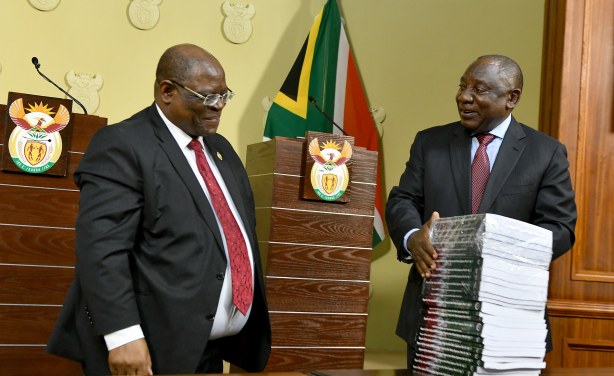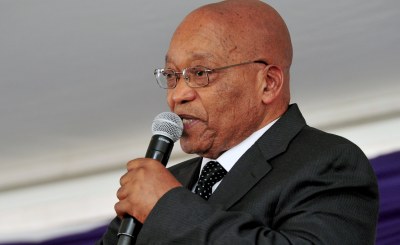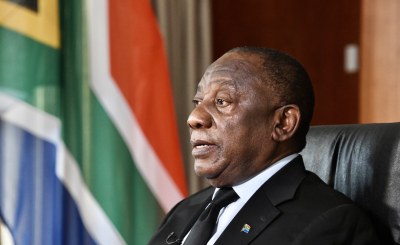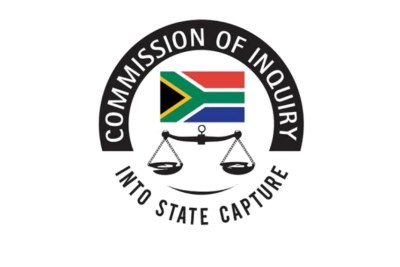-
South Africa: Can Amnesty for Perpetrators Help End State Corruption?
New Agenda, 31 October 2022
Given the clear lack of capacity in prosecutorial institutions, particularly the National Prosecuting Authority, will some form of amnesty encourage state capture perpetrators to… Read more »
-
South Africa: Former Eskom Boss Arrested With Wife and Step-Daughter
Scrolla, 27 October 2022
The wheels of justice are now in full swing after former Eskom acting chief executive Matshela Koko, his wife Mosima, and stepdaughter Kokesto Choma were arrested on Thursday. Read more »
-
South Africa: Authority Commits to Continue Implementing State Capture Report Recommendations
SAnews.gov.za, 24 October 2022
The National Prosecuting Authority (NPA) says it is ready to "support and implement" the measures set out by President Cyril Ramaphosa when he laid out government's plans on the… Read more »
-
South Africa: Ramaphosa's Action Plan - Clear On Stopping Future Procurement Corruption
Daily Maverick, 23 October 2022
Future-proofing South Africa against State Capture took half of the 76-page implementation plan President Cyril Ramaphosa submitted to Parliament. It backs the tone of his… Read more »
-
South Africa: ANC to Hand Over a List of Zondo Inquiry-Implicated Members to Party's Integrity Commission
Daily Maverick, 23 October 2022
As Cyril Ramaphosa announces steps to implement the State Capture inquiry's recommendations, the ANC says it has distanced itself from those in its ranks 'who have been involved in… Read more »
-
South Africa: Former President Zuma Calls Courts Unjust After Completing Jail Term
VOA, 22 October 2022
South Africa's scandal-embroiled former president, Jacob Zuma, addressed the media Saturday for the first time after completing a 15-month jail term for contempt of court, alleging… Read more »
-
South Africa: Corruption in South Africa - New Book Sets Out How Ruling ANC Lost the Battle
The Conversation Africa, 30 August 2022
One of the greatest benefits of South Africa's democracy is freedom of speech and publication. Mpumelelo Mkhabela's book, The Enemy Within, is the latest in a cascade of… Read more »
-
South Africa: South Africa's ANC Split Over 'State Capture' Probe
DW, 30 April 2021
South Africa's President Cyril Ramaphosa says the ruling ANC should have done more to fight graft during Zuma's presidency. Ramaphosa was testifying in a probe on how the Gupta… Read more »
South Africa Debates Amnesty for State Corruption Offenders
South Africa's government is struggling to get to grips with the massive hijacking of state resources for private benefit which occurred especially under the administration of former President Jacob Zuma. In 2019, his successor, President Cyril Ramaphosa, estimated that the phenomenon - which South Africans call "state capture" - cost the country more than 500 billion South African rand (more than U.S.$25 billion).
Ramaphosa recently outlined how his administration intends to implement the recommendations of a judicial commission of inquiry which spent four years probing the corruption. What is set become a landmark trial of some of those allegedly responsible for the most egregious corruption will begin next year.
The country's prosecutors have pledged to implement the measures Ramaphosa spelled out. But the undermining of the effectiveness of law enforcement agencies which was part of the state capture project of the previous administration raises doubts over whether the government has the capacity to deal with all the miscreants.
In the face of this challenge, some leading figures - including the government ombudsman who first exposed the Zuma administration's corruption and recommended the establishment of the judicial commission - have suggested that amnesties should be offered to those willing to come clean and pay back the proceeds of their corruption.
In a detailed discussion of the proposals, Karam Singh and Tharin Pillay, writing in New Agenda, consider whether the country would be better served by granting amnesties or developing new, stronger and more effective measures for dealing with the corrupt.
InFocus
-
President Cyril Ramaphosa has announced actions taken by the government against those implicated by the State Capture Commission of Inquiry, for benefiting f Read more »

President Cyril Ramaphosa formally received the fifth and final Judicial Commission of Inquiry into Allegations of State Capture, Corruption, and Fraud in the Public Sector including Organs of State at the Union Buildings in Pretoria on June 22, 2022.The report was presented to the President by the Chief Justice and Commission Chairperson, Judge Raymond Zondo.




